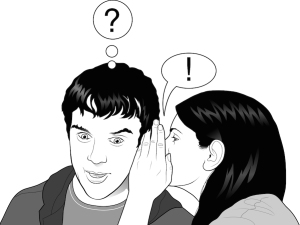
A young person with long hair and a colorful beaded necklace stands smiling, with another person, out of focus, standing behind them. They are outdoors.
For a young woman, the process of exploring your sexuality for the first time should be an exciting, empowering, and enlightening one.
Unfortunately, we often forget that.
Instead, our society is steeped in messages that depict women’s sexual awakenings as scary, painful, and confusing.
Folklore and fairytales give the impression that a woman’s foray into sexual activity must come at a price. And well into the 21st century, women receive warnings that link sexuality to physical and emotional trauma.
As a teenager, no adults initiated conversations with me about sexuality. So I was left to assess the messages I got from the media myself: Sex is painful. Sex is violent. Sex is something that is taken from you.
I became really scared of my own sexuality. I abstained from sex for a while because I thought it would change who I was, and when I did become sexually active, I often prioritized my partners’ pleasure over mine.
If someone had been there to teach me healthier messages about sex, I might have known that sex could be better than what people were saying. I wish someone had told me I wasn’t idealistic to hope for unequivocally positive sexual experiences.
In particular, I wish someone had debunked the following myths. So I’m debunking them now in the hopes that any young woman about to start exploring her own sexuality will no longer believe them.
Myth 1. Sex Only Means One Thing
Being the bookish, somewhat antisocial kid I was, I learned about sex from the dictionary at age 10. I heard someone reference it on the bus as “the way you make babies,” and it sounded intriguing. So I decided to look it up.
Since the dictionary definition of sex – “sexual activity, including specifically sexual intercourse” – is not very informative, I relied on the dictionary definition of “sexual intercourse”: “sexual contact between individuals involving penetration, especially the insertion of a man’s erect penis into a woman’s vagina, typically culminating in orgasm and the ejaculation of semen.”
I’m serious. Google it.
Aside from being sexist as hell, this makes it seem like the only way to have sex is to put a penis in a vagina. Which makes it sound like only straight, cisgender people have sex.
The conversations I had later with my friends confirmed that sex meant a penis going into a vagina – and that this act was more significant than oral or manual sex. Those were just “fooling around.”
And if you only fooled around, you were still a virgin – which was a different, more innocent type of person.
A high school teacher I admired told the class not to have sex until we were in our 20s. That stuck with me, and for a while, I took pride in “losing my virginity” at age 20.
But the truth is, I became sexually active at age 17, the first time I “fooled around.”
For the first two years of college, I stopped short of penis-in-vagina sex until I had a serious boyfriend because I was scared that act would somehow change me.
When I did do that, I put more stock in the relationship than it deserved because he “had” my virginity. We weren’t a great match, but if I broke up with him, I’d be one of “those girls” who has sex without true, lasting love.
For the remainder of this article, to avoid furthering the damage done to me and others by defining sex narrowly and heteronormatively, I’m going to call “fooling around” what it is. Those activities may have involved slightly different body parts in different configurations, but I was physically intimate with someone for the purpose of obtaining sexual pleasure.
Let’s call a spade a spade: It was sex.
Myth 2. Sex Means Love
Before anyone even talked to me about sex, I somehow learned to connect sex with love. Maybe it was the girls’ self-help books I read, which said you should wait until you’re in love with someone before you sleep with them.
Maybe it was the way I heard people talk about women who had sex without love.
Whatever it was, I got the idea that sex was a way to solidify my relationship with my boyfriend – and that I shouldn’t do it if I didn’t have a boyfriend in the first place.
Soon, however, I realized through experience that sex is not inherently loving. It can be done lovingly when it is trusting and communicative, like anything else.
But if someone has sex with you, that doesn’t mean they love you, and it doesn’t mean you’ll be closer afterward.
In fact, when the communication is poor, sex can actually leave two people feeling farther apart than ever.
Believing that sex is love obscures the effort necessary to demonstrate actual love. It both devalues love and over-values sex.
Myth 3. Sex Will Make People Like You
As a straight woman, I learned that what men really wanted out of me was sex. So, even though having sex was a “slutty” thing to do, the approval I got in return might make those supposed transgressions worth it.
While there were instances when others pressured me into sexual acts, I was often the one to pressure myself. I was scared that guys wouldn’t like me if I wasn’t up for the kind of relationship they wanted.
Never mind whether or not I liked them.
For the most part, though, when I’ve had the courage to say “no,” nobody’s held it against me. When they have, I immediately understood that they were not the kind of person I ever wanted to be alone in a room with, let alone have a relationship with.
Any decent person (read: not a rapist) will want you to do only what you’re comfortable with, and their opinion of you won’t change if you’re uncomfortable with something they want. In fact, they’ll be glad you’re taking care of yourself by protecting your boundaries.
Myth 4. Sex Will Make People Dislike You
During my freshman year of college, it seemed to hit my parents that they’d never talked to me about sex – because suddenly, they had a lot to say on the matter. I kind of wish they didn’t.
They told me to steer clear of one-night stands because they’d earn me a “reputation” and because it would make my partners lose interest due to “male psychology.”
Neither of these things happened, but I was scared they would.
My sexual interactions were tinged with the fear that my partner would no longer buy the cow, since they could get the milk for free – as if sex couldn’t be mutually rewarding.
Years went by before I realized that if someone’s just looking for a hookup, withholding sex won’t change that, and if someone’s looking for a relationship, sleeping with them won’t change that either. And even if they don’t want to date you, that doesn’t mean they don’t like you. It just means you’re not looking for the same thing at that moment.
Sex won’t make people like you or dislike you. People will like or dislike you based on your character. Even if they seem to judge you for your sexual behavior, their opinions aren’t really about you.
They’re about what you can provide for them – and that’s not a healthy dynamic to begin with.
Myth 5. Guys Are Out to Take Advantage of You
Along with the “guys just want sex” mentality came the “guys are trying to prey on you” warning. Women shouldn’t wear short skirts or go into a man’s room alone, people told me, because they’re putting themselves in danger.
As if rape were some sort of natural disaster with no human choice behind it.
Fortunately, in college, I started to have discussions about sexual assault and boundaries with my peers. And I learned that sex didn’t have to be a game that a man wins by convincing a woman to sleep with him.
I learned that people of all genders had many of the same concerns. Women weren’t the only ones to experience sexual assault, and we also weren’t the only ones to want more than a physical relationship.
While the exact numbers are hard to determine, it appears that the number of men who are sexual assault victims is larger than the number of men who are rapists. Learning this helped me see to that we are on the same page, as did learning that many men I knew wanted more than sex but felt confined by gender norms.
Straight people (and others as well, since everyone is assumed to be straight) learn to view relationships as power struggles between two different types of people with opposing desires.
So, the most liberating fact I’ve learned about relationships is that we’re all individuals.
Now, if I hear a potential date say stuff like “men and women are complementary” or “we should celebrate our differences,” I run in the opposite direction – because it probably means that somewhere inside them, there’s a belief that men are in pursuit of sex while women can grant or deny it.
And that belief can very quickly slip into viewing sexual assault as natural and inevitable, which it absolutely isn’t.
Myth 6. You’re Not Capable of Taking Advantage of Anyone.
Another insidious effect of the belief that men are predators and women are prey is the belief that women can’t be sexually manipulative or coercive.
Because discussions of sexual misconduct often center on women as victims and men as perpetrators, it took a long time for it to occur to me that I needed to be as careful about my partners’ boundaries as I wanted them to be about mine.
There were times when I complained because my partner didn’t want to have sex. There was one time I even undressed myself after my boyfriend said he wasn’t in the mood that night because I’d seen Jennifer Anniston do that in a movie trailer and it was depicted as a cute, funny thing to do.
De-binarizing the way we talk about sex means not only acknowledging the positive ways we’re all alike but also acknowledging our negative commonalities. One of these is that we’re all capable of sexual assault and misconduct, and we all need to learn how to practice consent cautiously.
Myth 7. Don’t Expect It to Be Good at First
When we talk to women about their first sexual experiences, it’s often in the form of a warning. The warnings I received included: 1. It’ll hurt. 2. You’ll get attached. 3. You won’t get much pleasure out of it. 4. Make sure it’s with someone you really love and trust, or they’ll break your heart.
If I could erase one thing I was taught about sex (and this time, I am talking about penis-in-vagina sex, because that’s how it was taught to me), it would be the notion that it’s normal for it to hurt.
Yes, there are some women who experience this. But not for the reasons you might think.
In reality, if sex hurts, it’s usually a sign that you’re not ready or not sufficiently aroused. It’s not usually because of the hymen. In fact, the whole notion of the hymen is so wrong that some medical professionals won’t even use the word.
The Swedish Association for Sexuality Education has instead coined the term “vaginal corona” to more accurately describe the thin, small pieces of tissue sometimes found around the vaginal opening. You don’t always have it when you’ve never had vaginal sex, and it doesn’t always go away after you do.
For me, despite my friends’ warnings that vaginal sex for the first time would hurt, it didn’t. It actually felt awesome.
But it concerns me to think about the women who did experience pain – and didn’t stop because they thought it was normal. It also concerns me to think about women who didn’t experience pleasure and thought that was normal, too.
The belief that these things were normal made me feel abnormal. My boyfriend even asked me when I had broken my hymen because he thought every woman had one and was surprised that there wasn’t any pain or blood.
I felt like the event didn’t occur the way it was supposed to – like it was less special because of that. All the media depictions I’d seen of girls losing their virginities had made it seem special because they trusted their partners to see them in pain and to not make the pain too extreme.
After I talked to my friends about it, though, a lot of them had also been surprised to find that they didn’t seem to have a hymen either – at least not the version of it we’d learned about.
Then why does the belief in this mythical body part persist?
I think it’s part of the symbolic idea that for women, sexuality comes with a price. We’re not supposed to experience pleasure without pain. That’s cheating.
We need to pay our dues, whether that’s in the form of physical pain, emotional heartbreak, or public shaming. Being sexual can’t be simple.
But it can be. Sexuality can be whatever you make it. And I wish I had been taught that sooner.
That’s a scary thought, though. It kind of takes the significance out of all the acts we’ve been taught are significant. But it’s also exciting, because it means we can define our sex lives as we please.
For example, while the traditional idea of virginity doesn’t ring true for me, I still really like the idea of virginities, plural: the first time you have sex in the shower; the first time you masturbate in front of someone; the first time you try a new position. That way, the supply of virginities is unlimited, and their loss is never really a loss because there are always more to “lose.”
And while I hate the idea of men and women as complementary, I love the idea of different people complementing one another in different ways – ways that you would have never predicted and that will be different with every partner.
For a girl first navigating sex and relationships, sexuality can feel like a prison confining you to pain and suffering and disapproval and danger. But, I promise, it’s the opposite.
It’s an open field full of possibilities that are changing every second, and the only bars are the ones society locks us behind. Nobody really wants to be restricted in this way, though, and if you break free, you’ll find people who will follow you outside.
[do_widget id=’text-101′]
Suzannah Weiss is a Contributing Writer for Everyday Feminism and a New York-based writer whose work has appeared in The Washington Post, Salon, Seventeen, Buzzfeed, The Huffington Post, Bustle, and more. She holds degrees in Gender and Sexuality Studies, Modern Culture and Media, and Cognitive Neuroscience from Brown University. You can follow her on Twitter @suzannahweiss.
Search our 3000+ articles!
Read our articles about:
Our online racial justice training
Used by hundreds of universities, non-profits, and businesses.
Click to learn more




















